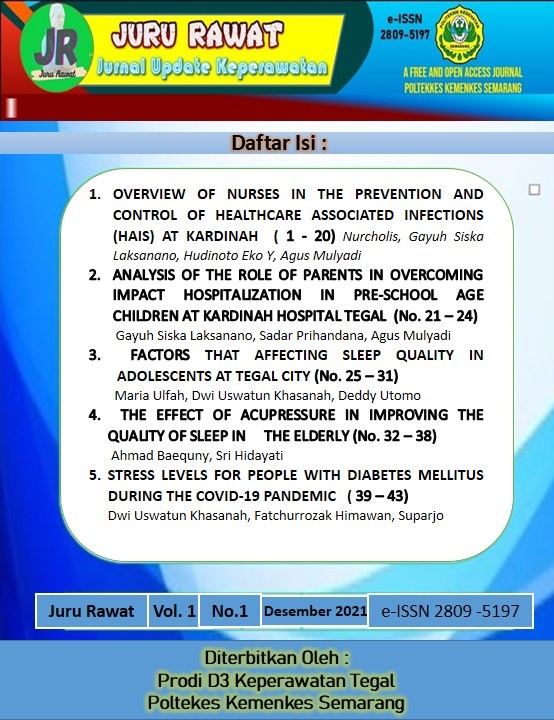STRESS LEVELS FOR PEOPLE WITH DIABETES MELLITUS DURING THE COVID-19 PANDEMIC
DOI:
https://doi.org/10.31983/juk.v1i1.8065Keywords:
COVID-19, Diabetes Mellitus, StressAbstract
Since December 2019, Coronavirus Disease 2019 (COVID-19) which first appeared in Wuhan, China has seen a rapid increase in cases and deaths worldwide, including Indonesia. Several studies have shown that diabetes is one of the most commonly reported co-morbidities in severe COVID-19 patients. This fact causes psychological problems for people with Diabetes Mellitus, one of which is stress. Prolonged stress can lead to poor glycemic control. Therefore, it is necessary to identify stress in people with Diabetes Mellitus. The purpose of the study was to obtain an overview of the stress level of people with Diabetes Mellitus. The design of this study was a quantitative research with a descriptive approach. The number of samples as many as 33 respondents with purposive sampling technique. Stress levels were measured using the Perceived Stress Scale (PSS)-10 questionnaire. The results of the study showed that most of the respondents had moderate stress levels (42.42%). The results of this study can be a reference for nurses in preventing and overcoming stress in people with Diabetes Mellitus.
References
A. Nursucita and L. Handayani, “Faktor Penyebab
Stres Pada Penderita Diabetes Melitus Tipe 2
Factors Causing Stress in Type 2 Diabetes Mellitus
Patients,†Jambura J. Heal. Sci. Res., vol. 3, no. 2,
pp. 304–313, 2021.
L. E. Joensen et al., “Diabetes and COVID-19: psychosocial consequences of the COVID-19 pandemic in people with diabetes in Denmark—
what characterizes people with high levels of
COVID-19-related worries?,†Diabet. Med., 2020. [3] Z. J. Gazzaz, “Diabetes and COVID-19,†Open
Life Sciences. 2021.
A. Baidya et al., “Diabetes and covid-19: A
review,†J. ASEAN Fed. Endocr. Soc., 2020. [5] T. Minuljo et al., “Karakteristik dan Keluaran
Pasien COVID-19 dengan DM di RS Umum Pusat
Dr . Kariadi,†Medica Hosp., vol. 7, no. 1A, pp.
–158, 2020.
S. Erener, “Diabetes, infection risk and COVID-
,†Molecular Metabolism. 2020.
N. Q. Nisbah, H. Harmayetty, and L. C. Dewi, “PENGARUH PEMBERIAN DZIKIR TERHADAP STRES DAN GULA DARAH
ACAK PADA PASIEN DIABETES MELLITUS,â€
Psychiatry Nurs. J. (Jurnal Keperawatan Jiwa),
L. Cohen, L. Manion, and K. Morrison, Research
Methods in Education, Sixth. 2007.
E. H. Lee, “Review of the psychometric evidence of the perceived stress scale,†Asian Nurs. Res. (Korean. Soc. Nurs. Sci)., vol. 6, no. 4, pp. 121–
, 2012.
I. E. Indira, “Stress Questionnaire: Stress Investigation From Dermatologist Perspective,†Psychoneuroimmunology in Dermatology, pp.
–142, 2016.
S. Smeltzer and B. Bare, Buku Ajar Keperawatan
Medikal Bedah Brunner & Suddarth, 8th ed. Jakarta: EGC, 2013.
S. Pranata and D. U. Khasanah, Merawat Penderita
Diabetes Melitus. Yogyakarta: Pustaka Panasea,
Ekonomi dengan Kejadian Diabetes Melitus Tipe 2 di Poliklinik Interna Blu RSUP Pof. Dr. R. D. Kandou Manado,†J. Kesehat. Masy., vol. 2, no. 1, p. 8, 2015.
N. Agarwal, M. Harikar, R. Shukla, and A. Bajpai, “COVID-19 pandemic: a double trouble for Indian adolescents and young adults living with type 1
diabetes,†Int. J. Diabetes Dev. Ctries., vol. 40, no.
, pp. 346–352, 2020.
M. H. Ismail and V. Yulian, “Pengaruh Dukungan
Kelompok Terhadap Kualitas Hidup Penderita
Diabetes Melitus,†J. Ber. Ilmu Keperawatan, vol.
, no. 2, pp. 51–58, 2019.
M. D. Durbin, R. Fitryasari, and M. Makhfudli,
“INDONESIAN JOURNAL OF COMMUNITY
ANALYSIS OF PSYCHOLOGICAL IMPACT ON DIABETES PATIENTS IN THE ERA OF PANDEMIC COVID-19 : A LITERATURE REVIEW,†vol. 6, no. 2, 2021.
A. Ghosh, B. Arora, R. Gupta, S. Anoop, and A.
Misra, “Effects of nationwide lockdown during COVID-19 epidemic on lifestyle and other medical issues of patients with type 2 diabetes in north
India,†Diabetes Metab. Syndr. Clin. Res. Rev., vol.
, no. 5, pp. 917–920, 2020.
M. M. Ruissen et al., “Increased stress, weight gain and less exercise in relation to glycemic control in
people with type 1 and type 2 diabetes during the COVID-19 pandemic,†BMJ Open Diabetes Res. Care, vol. 9, no. 1, pp. 1–10, 2021.
K. Singhai, M. Kumar, N. Nebhinani, A. Rastogi,
and E. Jude, “Psychological adaptive difficulties and their management during COVID-19 pandemic in people with diabetes mellitus,†no. January,

